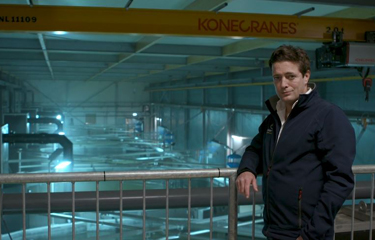The Kingfish Company said in an 8 February company update the expansion of its two recirculating aquaculture system (RAS) facilities in the United States and at its headquarters in Kats, The Netherlands are “advancing as planned.”
The company, which successfully listed on the Euronext Growth exchange (formerly known as the Oslo Stock Exchange’s Merkur Market) in November 2020, said its installed capacity for growing yellowtail kingfish will grow from its current 1,250 metric tons (MT) to between 8,000 and 11,000 MT by 2023 across both sites.
“Our mission is to further advance our first-mover position in technology driven aquaculture and continue to establish ourselves as a market leader in the sustainable production of high-value marine seafood,” Kingfish Co. CEO Ohad Maiman said in a company update. “The U.S. development is a natural progression in our scale-up strategy, as we aim to capitalize on our proven ability to design, build, and operate advanced land-based technology, and enable local and reliable supply of otherwise import-dependent high-value species.”
In its first market update since its public listing, The Kingfish Company said it produced 677 MT of kingfish in 2020, “exceeding the design capacity of its advanced recirculating aquaculture system (RAS) by as much as 30 percent.” The company achieved 0.64 kilograms of growth per square meter per day in Q4 2020, and recorded a 45 percent increase in the growth of its biomass year-on-year. Additionally, its hatchery is now fully operational and moving into grow-out performance, having produced one million fingerlings in 2020.
Its Kingfish Zeeland facility is now being expanded – groundwork has already begun – in a project that will increase its capacity from 1,250 MT to 3,000 MT annually when complete.
And in the United States, at the company’s Kingfish Maine site in Jonesport, Maine, design and permitting is underway, with the company’s submerged lands lease application approved in September 2020 and its remaining second water side permit under advanced review, according to the company. The Maine facility will eventually produce 6,000 to 8,000 metric tons of yellowtail kingfish, once complete.
The Kingfish Company maintained pre-COVID sales volumes and price levels through 2020, receiving an average of EUR 13.30 (USD 16.03) WFE per kilogram for its large fish and EUR 9.30 (USD 11.21) WFE per kilogram for its small fish in 2020.
“The company [showed] consistent sales figures in a year marked by restaurant lockdowns, consequently proving its ability to quickly adapt its product and channel mix to market changes. It is also a testament to the product’s versatility,” the company said.
“We are proud of our team for delivering sector-leading productivity figures that significantly exceed system design and maintaining stable sales volumes and price levels in 2020. This is a strong testament to our ability to adapt quickly and successfully to sudden market shifts, and for the benefit of operating our local, reliable, and sustainable production technology,” said Ohad Maiman, CEO of The Kingfish Company.
Maiman said his company was able to maintain an overall pre-pandemic sale run rate despite COVID-19 related restaurant closures as a result of a successful shift to retail and direct-to-consumer sales. The announcement shows the company has recovered from the early days of the pandemic, when its sales were off 20 to 30 percent.
“The closure or restaurants through 2020 required us to accelerate the development of our retail products, and yet the quality and versatility of our Dutch Yellowtail, and our commitment to environmentally friendly best practices enabled us to partner with blue-chip retail and direct-to-consumer channels,” Maiman said. “That agility contributed to maintaining pre-COVID sales run-rates through the year.”
Photo courtesy of The Kingfish Company







